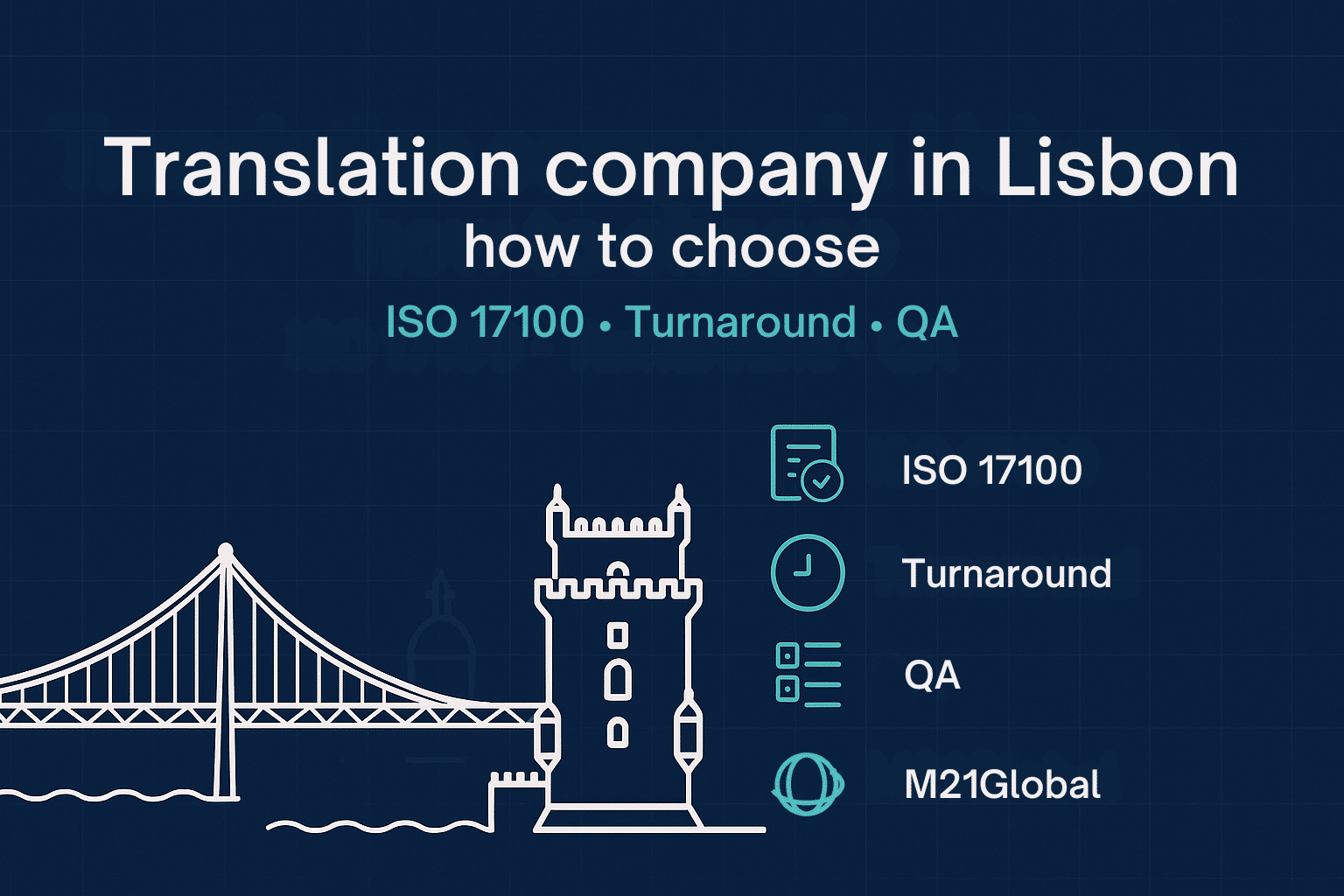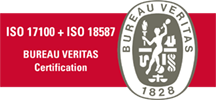How to Choose a translation company in Lisbon (ISO 17100, deadlines, QA)
Looking for a reliable translation company in Lisbon? Use this checklist covering ISO 17100, deadlines and quality assurance to choose with confidence.

Table of Contents
Choosing a translation company in Lisbon can feel daunting when timelines are tight and accuracy is non-negotiable. The right partner blends certified processes, specialist linguists and transparent communication. Use the guidance below to compare providers and make a safe, cost-effective choice.
What ISO 17100 really guarantees
For regulated content or high-stakes documents, prioritise providers audited against the international ISO 17100 standard. ISO 17100 defines the competencies of translators/reviewers and the steps a project must follow—from analysis to bilingual revision and final verification—so you are not relying on ad-hoc workflows. Read the official summary from ISO to understand the scope and limits of the standard (e.g., interpreting is out of scope). External reference: ISO 17100 overview (iso.org). (iso.org)
If you need a translation company in Lisbon that already operates under ISO 17100, validate how those processes show up in day-to-day work: glossary management, native-language translation, mandatory revision and documented sign-off. At M21Global, you can review our approach to Translation Services and PDCA-driven Continuous Improvement to see how we operationalise that standard.
Breadth of expertise and real-world specialisation
Your ideal partner should prove sector depth, not just language pairs. Ask for recent projects and team profiles in your niche—legal, technical, medical, financial, etc. Explore our service pages to see concrete workflows and deliverables for:
- Technical Translation (manuals, specs, patents)
- Legal Translation (contracts, deeds, court docs)
- Certified Translations when notarisation or apostilles are required
To gauge scale and language coverage when shortlisting a translation company in Lisbon, check historical volume and language spread. See M21Global’s story in We Translate the World and Ongoing Training to understand how we sustain specialist teams over time.
Deadlines: how to secure on-time delivery without sacrificing quality
Urgent jobs happen. A robust provider will:
- Analyse the source text for effort drivers (formatting, repetitions, domain),
- Propose a resourced timeline with checkpoints, and
- Protect quality through staged review rather than “translating faster”.
Ask how they scale: do they build project-specific termbases up front? Do they assign one lead linguist plus reviewers and a project manager? Our “Zero Errors, Total Satisfaction” commitment explains how we keep quality intact when deadlines are tight.
Quality assurance you can verify
A translation company in Lisbon should offer QA that is both human and technology-assisted: style guides, approved terminology, bilingual revision by an independent linguist, and pre-delivery checks for layout, numbers and units. Under ISO 17100, bilingual review is required; you can ask for a sample of the checklist or a redacted QA log. If your documents must be recognised abroad, confirm whether you also need legalisation. Many public documents require an apostille to be used internationally; consult the Hague Conference’s Apostille resources for the official rules. External reference: HCCH Apostille overview. (hcch.net)
Security and confidentiality
Request written NDAs and ask how files are stored, accessed and deleted. A professional translation company in Lisbon should restrict access to authorised staff, maintain audit trails and provide secure client portals. Clarify who handles PII and how backups are encrypted.
Transparent pricing and value
Compare providers on a like-for-like basis: language pair, domain, word count, formatting effort, turnaround and scope (translation + bilingual revision + final QA). Beware of quotes that exclude revision; under ISO 17100, independent revision is mandatory. Ask for sample reports, glossary exports and change logs—useful artefacts that add long-term value.
Local proof points to request
When you evaluate a translation company in Lisbon, ask for:
- Named project manager and escalation contacts
- CVs or profiles of proposed linguists (anonymised if needed)
- Evidence of native-language delivery and domain credentials
- Recent KPIs (on-time rate, first-pass acceptance, corrective actions)
- References from Portuguese clients in your industry
When you need certified or apostilled documents
If the recipient requires a certified translation, ensure your provider can coordinate certification with a notary/solicitor and guide you on apostilles where relevant. Start with our Certified Translations page, then verify apostille specifics through the HCCH site (competent authorities differ by country). External reference: HCCH Apostille section and full text of the 1961 Convention. (hcch.net)
Quick checklist (print and use)
- ISO 17100 audited? Written process supplied? (See ISO summary.) (iso.org)
- Sector expertise demonstrated with samples/references?
- Native translators + independent revisers confirmed?
- QA artefacts included (glossary, style guide, QA log)?
- Security (NDA, restricted access, secure portal) covered?
- Clear timeline with checkpoints and named PM?
- Certified translation and apostille guidance available when needed? (See HCCH.) (hcch.net)
If you’re compiling options for a translation company in Lisbon, this framework will help you compare like-for-like and avoid surprises. Explore our Translation Services hub or contact us for a tailored plan.
Get a tailored plan and quote (usually within 3 hours). Request a Free Online Quote
FAQ
1) What’s the practical difference between ISO 17100 and “best practice”?
ISO 17100 turns “best practice” into auditable requirements. It defines who can translate or revise (qualifications/experience), the sequence of tasks (analysis, translation, bilingual revision by a second linguist, verification) and the records a provider must keep. In day-to-day terms, this means you get consistent deliverables—glossaries, style guides, tracked changes—and accountability through correctives if something slips. A non-certified vendor can still do good work, but you’re trusting their word, not an audited system. For high-risk documents or regulated sectors, choosing an ISO-audited translation company in Lisbon reduces operational risk and simplifies vendor management for your compliance team.
2) How fast can a certified provider deliver without cutting corners?
Speed depends on volume, complexity, domain and languages. A typical professional throughput per linguist is measured in effective words/day after analysis (repetitions and terminology prep change the picture). Certified teams scale responsibly: they break work into packages, maintain one lead translator to ensure style consistency, and enforce independent revision. Tools help with consistency, but quality comes from workflow discipline—briefing, glossary approval, mid-project checks and final QA. For urgent cases, ask for a phased delivery plan and agree on acceptance criteria per batch so downstream teams can start earlier without risking rework.
3) Do I always need a certified or apostilled translation for official use?
Not always. “Certified” refers to a translation accompanied by a sworn statement before a notary/solicitor, while an apostille authenticates the signature/seal on a public document for international recognition among signatory states of the 1961 Hague Convention. Many institutions accept a certified translation without apostille; others require both. Your provider should confirm the destination country’s rules and coordinate the steps to avoid delays. Start by checking the HCCH Apostille guidance and confirm any country-specific authority requirements with your recipient before commissioning. (hcch.net)
4) How do you protect sensitive data in legal/technical projects?
Professional translation firms operate a “least privilege” access model, encrypted transit/storage, and signed NDAs with staff and freelancers. They also separate environments for production vs. testing, keep audit logs, and purge client data on a defined schedule. Ask your short-listed translation company in Lisbon for a data-handling summary and a sample DPIA or security policy. If you’re subject to sector rules (e.g., medical devices, finance), request evidence of staff training and process controls aligned to those frameworks, not just general statements.
Links
- Internal (EN):
https://www.m21global.com/en/translation-services/
https://www.m21global.com/en/continuous-improvement/
https://www.m21global.com/en/zero-errors-total-satisfaction-commitment/
https://www.m21global.com/en/ongoing-training/
https://www.m21global.com/en/translation-services/certified-translations/
https://www.m21global.com/en/translation-services/technical-translation/
https://www.m21global.com/en/translation-services/legal-translation/
https://www.m21global.com/en/we-translate-the-world/ - External (authoritative):
ISO 17100 summary — https://www.iso.org/standard/59149.html (iso.org)
HCCH Apostille overview + full text — https://www.hcch.net/en/instruments/conventions/specialised-sections/apostille and https://www.hcch.net/en/instruments/conventions/full-text/?cid=41 (hcch.net)

